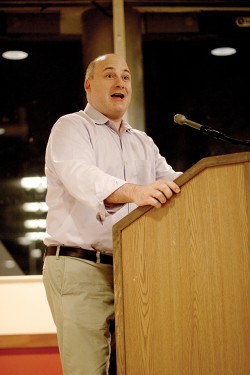What would campus look like if Portland State’s Campus Public Safety Office became a sworn law enforcement agency?
And how would these changes be paid for?
What would campus look like if Portland State’s Campus Public Safety Office became a sworn law enforcement agency?
And how would these changes be paid for?
What would campus look like if Portland State’s Campus Public Safety Office became a sworn law enforcement agency?
And how would these changes be paid for?

Miles Sanguinetti/VANGUARD STAFf
Last Week’s campus security open forum brought questions from students and answers from PSU administrators like Michele Toppe, dean of student life, and Phil Zerzan, CPSO chief.
To ask and hear answers to these and other questions, more than 40 students gathered with members of PSU’s administration in Smith Memorial Student Union’s Parkway North on Tuesday in an open forum coordinated by PSU’s student government.
Answering questions were CPSO Chief Phil Zerzan, Dean of Student Life Michele Toppe and Executive Director of the Center for Student Health and Counseling Dana Tasson. Vice President of Finance and Administration Monica Rimai was expected to attend but did not.
Several student groups were represented, including the Student Action Coalition, ASPSU, Students for Unity, International Socialist Organization and Students for Sensible Drug Policy.

Miles sanguinetti/VANGUARD STAFF
Dr. Dana Tasson, executive director for the Student Health and Counseling Center, spoke in support of CPSO’s proposed changes on Tuesday.
They wanted to hear the changes proposed for CPSO, if alternatives such as directing funding to crime prevention and increasing safety measures around campus had been considered, and where the money to fund the proposed changes would come from.
Students were also concerned with how the department would be overseen, what kind of training CPSO officers would receive, and whether students would get any input into the way the department would be run.
Zerzan said he’d like to create a police force integrated into PSU that is responsible to the university.
“We have the opportunity to create this from the ground up. We have the opportunity to have a police department more reflective of [the university community’s] values and…more geared to campus policing,” he said. “Students are primary stakeholders in this and would definitely be a part of the process.”
Student Neil Loehlein disagreed with the potential switch to sworn police officers, preferring a proactive approach.
“Prevention is the most important thing we can do to make the campus safer for students, and it would be more cost effective than the current proposal,” Loehlein said.
Fixing poorly lit areas around campus and creating a safe-walk program, where groups of students with two-way phones could walk together to different parts of campus late at night, are examples of better options, he said.
“I want us to be proactive in making this a safe campus,” Loehlein said.
But Zerzan said his public safety officers need to have the right tools and training if they’re going to be asked to function as police officers.
“They are not equipped with the tools to effectively take someone into custody [who] represents a threat to the safety of our community and the greater community,” he said. Zerzan then cited the June 11 arrest of David Chilton, who pointed a gun at CPSO Patrol Officer Shawn McKenzie when confronted.
Zerzan said PSU’s criminal justice division studied CPSO arrests and found that 41 percent of the arrests were of non-PSU-affiliated subjects who had a recorded history of prior violent offenses, and 87.2 percent had at least one arrest on record before their arrest at PSU.
Zerzan also said that CPSO is grossly understaffed.
“We have 0.5 officers per 1,000 students, and the national average is 1.8 officers per 1,000 students.”
ASPSU Vice President Marlon Holmes said he is concerned that the officers aren’t receiving the diversity and multicultural training needed to accommodate PSU’s diverse campus.
“My personal issue is…I don’t necessarily believe the arming of our officers is the answer to safety on campus,” Holmes said.
Tasson said that having a police force that answers to the university allows for input on training and how officers respond to students, and facilitates cooperation.
“We already have a great relationship with CPSO in that regard, and we don’t have that same relationship with Portland Police Bureau,” Tasson said. “We have a really complex campus environment, and having a police force geared toward our needs…would help promote the health and safety of our campus community.”
ASPSU President Tiffany Dollar was unable to attend but said in a phone interview that she wants to hear students’ views on the issue. In order to gauge student sentiment, ASPSU plans to launch a survey campaign in January.
“We definitely have a safety issue on campus, and hopefully the survey will help us find solutions that are in the best interest of the students,” Dollar said.
Toppe said she is confident that, with input, the change would deliver specially trained officers who understand student life and day-to-day campus operations.
“We have to make sure as many perspectives as possible are included as we move forward in planning the safety of our campus,” Toppe said. “Phil Zerzan is the person I trust to lead that movement. He has transformed the CPSO relationship with the student body. I see incidents every day of the positive changes he has instituted.”
The Oregon Revised Statute concerning rules for university police departments and officers is ORS 352.383, available online at leg.state.or.us/ors/352.html.